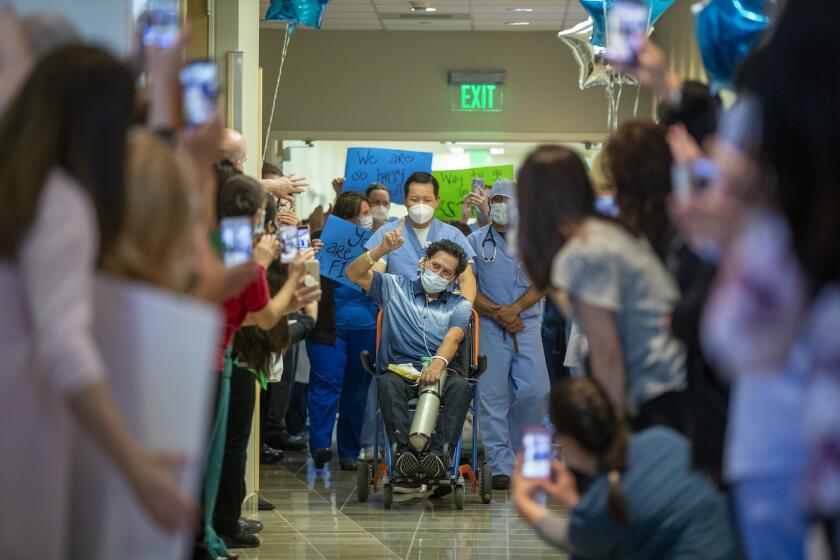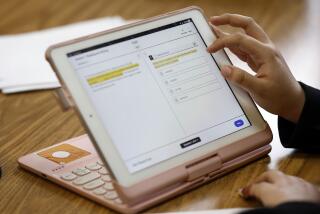Coronavirus changes the AP test, big time. Here’s what it will look like
- Share via
For 65 years, the Advanced Placement test has been a hallmark of a rigorous high school education, allowing bright students to demonstrate mastery of a subject through a passing score that can lead to college credits.
Students typically gird for the grueling exam in long study sessions with friends or outside class hours with teachers. It’s not unusual for parents to hire specialized tutors. For some students, it becomes a point of pride to report how many AP courses they are taking.
But amid the COVID-19 pandemic, this year’s test will be like no other, according to new details released Friday by the College Board, the New York-based nonprofit that owns the test.
These are some of the unusual new scenes across the Southland during the coronavirus outbreak.
Normally, there are dozens of multiple-choice questions. Those will be gone. The free-response questions will be winnowed down from a typical four or so to one or two, which will be timed separately and submitted.
The exams will be taken at home with open books and notes and will last only about 45 minutes, significantly shorter than the standard three- to four-hour duration. The exams can be taken on any device available — a computer, tablet or smartphone. Or students can write responses by hand and submit a photo via their cellphones.
To make sure that all students have access to the test, the College Board said it is working with partners to provide thousands of Chromebooks and tablets, along with broadband internet access, to all who need them.
The revised format brought varied reactions. At Mayfield Senior School, an all-girls Catholic school in Pasadena, students enrolled in an AP Calculus BC (second and third stage) class expressed a range of reactions: relief, disappointment and excitement by the challenge of taking the test in an entirely new way.
Megan Moffat, who says she’s “kind of a thrill seeker,” was eager to test herself on racing through a shorter exam on which every question will carry higher stakes.
Isabel Valenzuela said it will be easier to keep up stamina with a shorter test; when she took the full-length practice exam — more than three hours long — she found herself getting antsy. “I can just use all of my energy and power for a shorter sprint than for, like, the marathon,” she said.
Halle Villalobos and Agnese Sanavio, however, said they were disappointed that they won’t get to showcase all of the skills they’ve learned in the last year or delve into calculus concepts as deeply as they might have. Other students said they missed the personal connections of prepping for the exam at school, able to turn to a classmate for help or visit teachers during office hours.
But Paloma Torres said the at-home study has helped her gain independence and self-motivation, while Lauren Clawson said the changes offered a “good life lesson.”
“It’s helping us adapt to unexpected and unforeseeable situations, which is kind of life,” Clawson said.
Trevor Packer, a College Board senior vice president who heads the AP program, said such student dedication is why the nonprofit decided to dismiss early thoughts about potentially canceling the exam when the coronavirus outbreak prompted schools to send students home and shift to online learning.
In a survey of 18,000 AP students, 91% said they wanted to take the test and filled 900 pages with comments about why. Many said studying was their “last vestige of academic normalcy,” having lost their sports seasons, proms, graduation ceremonies and senior-year trips, Packer said.
But testing officials had to satisfy themselves that they could create a fair and secure online exam before committing to one, he said. Key areas of concern included equitable access for students with disabilities and those without adequate devices or broadband access. Colleges and universities would need to agree to award college credit for passing scores.
And strict measures had to be taken to prevent and detect cheating, another pressing issue.
To avoid leaks, the same tests will be given at the same time throughout the nation, from May 11 to May 22. Makeup test dates will be available for each subject from June 1 to June 5. For California students, the tests will be administered at 9 a.m., 11 a.m. and 1 p.m., depending on the subject.
Points will not be earned from content that can be found in textbooks or online. Rather than multiple-choice questions, there will be short-response and document-based questions that require synthesis of material, application of concepts and critical thinking. Software will be used to detect a student’s unique identity and style of online interactions, Packer said, along with plagiarism or similar answers among groups of students.
In addition, the College Board will release the completed exams to AP teachers so they “can see if a student who has been mediocre all year is suddenly perfect,” Packer said.
If students get caught cheating, the penalties will be severe. They will be blocked from testing or their AP scores will be canceled. Their high school will be notified, as will colleges or other organizations to which the student has already sent College Board scores, including the SAT. And they may be prohibited from taking a future AP exam, as well as the SAT, SAT subject tests or other assessments, the nonprofit said.
Those strict security measures drew praise from some students. “I feel like this is a great option for AP exams pertaining to how it would eliminate the need to cheat, since that was a main concern with taking the exams online,” said Jade Hollingsworth, an Upland High School student bound for UCLA who is taking AP courses in literature, art history and studio art.
Despite the truncated format, the University of California announced this week that it would accept the results of this year’s exam. Hundreds of other institutions have given similar assurances, Packer said.
AP teachers praised the College Board for not canceling the tests and for addressing their myriad concerns.
Monty Armstrong, an AP World History teacher at Cerritos High School who initially thought an online test could be a “disaster” with the potential for widespread cheating, said the College Board had assuaged all of his concerns.
By giving the test at the same time everywhere and sticking to document-based questions, which require skills and training to answer, not merely internet searches, “the College Board has made really good choices,” he said.
At Mayfield, AP teacher Melissa Tighe said she was gratified that the testing nonproft gave students the chance to weigh in and listened closely to what they had to say. She also said the College Board’s handling of the issue showed students a real-life example of collaborative problem-solving.
“I love the way they’re going about this, and I think they’re really role-modeling consensus-building thinking for my students, who are the future decision-makers,” she said.
More to Read
Sign up for Essential California
The most important California stories and recommendations in your inbox every morning.
You may occasionally receive promotional content from the Los Angeles Times.












